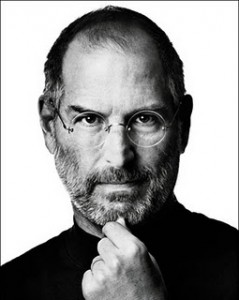Apple Loses Founder and CEO After Battle with Cancer
 The world lost a visionary on Oct. 5, 2011, when Steve Jobs, founder, CEO, and Chairman of Apple Inc., passed away after a long and enduring battle with pancreatic cancer. Jobs was compared to the likes of Henry Ford and Thomas Edison, having uprooted entire industries and made changes that today seem all but impossible to live without.
The world lost a visionary on Oct. 5, 2011, when Steve Jobs, founder, CEO, and Chairman of Apple Inc., passed away after a long and enduring battle with pancreatic cancer. Jobs was compared to the likes of Henry Ford and Thomas Edison, having uprooted entire industries and made changes that today seem all but impossible to live without.
While Jobs’ life has ended, his legacy continues on. News of his death, which reached millions of people around the world devices he had a helped to create, sent shockwaves throughout the Internet. Jobs is most well known for his time spent at Apple, during which he helped create groundbreaking devices such as the Apple II, Macintosh, iPod, iPhone, iPad, and most lately, iCloud.
“In his life, he made many great impacts on the tech industry,” said junior Adam Laytham. “But it will take time to see how the world fares without him.”
In 1977, Jobs unveiled his Apple II, the first computer to generate color graphics. It was beautiful, and n one had ever seen the likes of it before. This was a physical manifestation of Jobs’ vision: to create a computer that was both affordable and usable to those without a computer-engineering degree or some innate talent. In 1985, Apple CEO and young Jobs had a falling out, which resulted in Jobs being exiled from the company. This 12-year period is perhaps the most essential to Jobs’ future success. During this time, Jobs founded two companies: NeXT, a computer company that would later be purchased by Apple; and Pixar, which went on to produce Toy Story, the first computer-animated film, and the first of many immensely popular titles that the company would later create.
“What is so important about [Steve Jobs] is that he exemplified the American dream; he didn’t come from wealth, but at the end of his life he headed one of the richest companies in the world,” said Laytham.
When Jobs returned to Apple after their purchase of NeXT, he continued to innovate. Before long the world met the first iPod, and soon after the iTunes Store, which exceeded all expectations and changed the way people listen to music forever. Years later, Jobs unveiled the iPhone, which is today’s most popular smartphone in the world. Only a day before his death, the next installment in the iPhone line was unveiled: the iPhone 4S. Jobs, who took pride in being able to tell consumers what they want before they wanted it, then took a major risk with the iPad. The tablet market was all but nonexistent before Apple’s iPad, which led to an array of tablets being released by competing companies. Now, tablets are becoming commonplace in many households around the world.
“Jobs was probably the most important factor in making technology what it is today,” said junior David Vogan. “Everywhere you look, you’ll see some kind of Apple product. Jobs didn’t just create useful gadgets, but also helped mold the Age of Information to what it is today.”
Without its visionary, the future of Apple is uncertain. Some say Tim Cook, the new CEO, will take up the reigns and lead the company in new directions. Others think that iOS creator Scott Forstall is Apple’s only hope for replacing Jobs as Apple’s intuitive, risk-taking innovator. Whomever may decide to steer the multi-billion dollar company, it is clear that Apple can never have another Steve Jobs.
Steven Chaffin Jr.